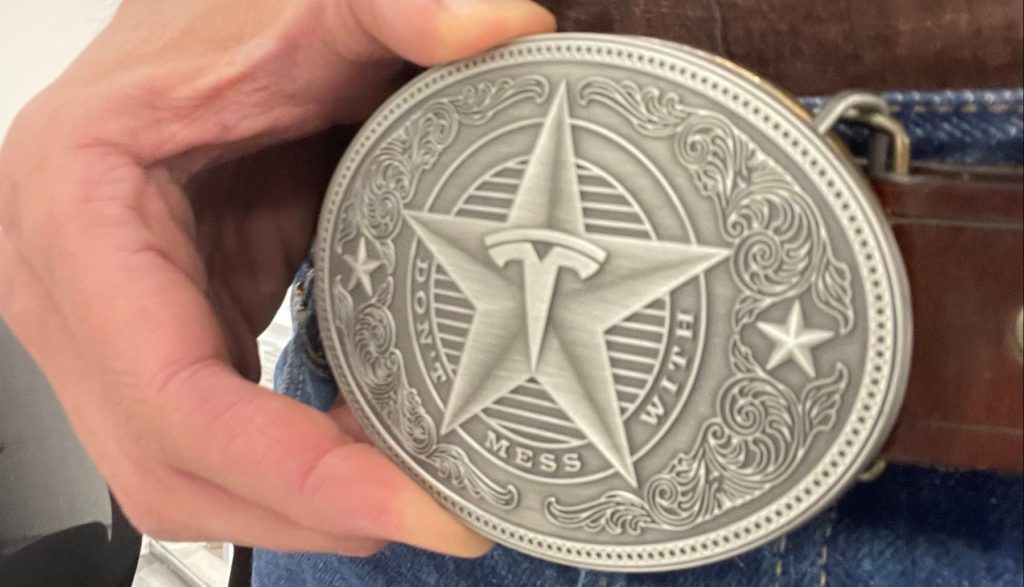Musk to move Tesla headquarters to Texas from California

Tesla is moving its corporate headquarters to Austin, Texas, where a new factory for the Model Y and forthcoming Cybertruck is nearing completion, relocating from California after making the Golden State its home for 18 years.
Chief Executive Officer Elon Musk announced the move at the Austin plant Thursday during the electric-vehicle maker’s shareholder meeting.
Tesla, which was founded in 2003, was first based in San Carlos, California. It announced a move to Palo Alto, the leafy Silicon Valley suburb that’s home to Stanford University and several venture capital firms, in 2009, the year before its IPO. But the company has grown from scrappy startup to the world’s most valuable automaker, and Texas — centrally located between the two coasts — has become its center of gravity in the U.S.
Musk’s decision to move the headquarters to Texas comes despite growing discomfort among some companies with the state’s policies, such as a recent abortion law — that’s been temporarily blocked — and efforts to restrict voter rights.
But Tesla is just the latest California company to move to Texas, which has lower taxes, a lower cost of living and fewer business regulations. Hewlett Packard Enterprise Co. has shifted its base to Houston and Charles Schwab Corp. moved its headquarters to the Dallas area from San Francisco.
“We welcome Tesla home!” Austin Mayor Steve Adler said in an email. “It’s a tech company that creates the clean manufacturing, middle skill jobs Austin needs.”
The carmaker joins a number of other tech companies with operations in Austin. Dell Technologies was founded in the city, and Apple Inc. and Facebook Inc. have a large presence. Oracle Corp. said last year it was moving its headquarters to Austin from Silicon Valley, one of several transplants to the Texas state capital during the pandemic.
“This is the newest economic development trophy on Governor Abbott’s wall,” John Boyd, a corporate relocation consultant based in Princeton, New Jersey, said by phone on Thursday. The move is important to the state’s efforts to attract tech talent and also to Tesla’s efforts to appeal to a wider swath of U.S. consumers with the launch of its new pickup, he said.
“Tesla is trying to expand its brand and appeal to Middle America,” Boyd said.
Related Article: Tesla’s gigafactory electrifies California-Germany culture clash
Musk said Tesla isn’t abandoning California, noting the electric-car maker will continue to expand manufacturing in the state and aims to boost production at its vehicle factory in Fremont — and at its Nevada battery plant — by 50%.
“We will continue to expand our activities in California. This is not a matter of Tesla leaving California,” he said.
California Governor Gavin Newsom’s office and the state’s economic development agency didn’t respond to requests for comment.
“Mr. Musk’s announcement highlights yet again the urgency for California to address our housing affordability crisis and the many other challenges that make it so difficult for companies to grow here,” said Jim Wunderman, president and CEO of the Bay Area Council, which represents companies in the region.
There have been several clues such a move was in the offing. Musk, the world’s richest person according to the Bloomberg Billionaires Index, moved his private foundation to Texas in December. Zachary Kirkhorn, Tesla’s chief financial officer, bought a house in a tony district of Austin and Tesla has datelined each of its last two press releases from Austin.
Musk moved to Texas himself last year to focus on two big priorities for his companies: SpaceX’s new Starship vehicle, under development on the Gulf Coast near Brownsville, and Tesla’s Gigafactory in Austin. Texas has no personal income tax, while California imposes the highest personal income levies in the nation on its wealthiest residents.
Texas is the company’s third-biggest market in the U.S. after California and Florida, though years of opposition from auto dealers mean it can’t sell its electric cars directly there.
In 2010, Tesla purchased a shuttered auto plant across the San Francisco Bay in Fremont. Roughly 10,000 people work at the plant, a former joint venture between General Motors Co. and Toyota Motor Corp., and scores of other Tesla employees work at showrooms, service centers and offices throughout the region.
Musk’s long-term relationship with California soured in the spring of 2020 during the first wave of the coronavirus. When Alameda County ordered production stopped at Tesla’s plant in Fremont, Musk openly defied public health officials by closing late and reopening early, blasting the rules as “fascist” on an earnings call.
He briefly sued the county, but Tesla has continued to expand its footprint in the Golden State. A new “Megafactory” that will make Mega packs — the energy-storage product Tesla sells to utilities — is under construction in the Central Valley city of Lathrop.
(By Dana Hull and Gabrielle Coppola, with assistance from Romy Varghese)
{{ commodity.name }}
{{ post.title }}
{{ post.date }}




Comments
M GRAFTON SMITH
TEXAS HAS DONE NOTHING TO RESTRICT VOTER RIGHTS, AND THE “HEARTBEAT LAW’ WAS REINSTATED YESTERDAY. THOSE STATEMENTS WERE NOT RELEVANT TO THE STORY ANYWAY.